Wasm Smart Contracts in Ink!
How to use the slides - Full screen (new tab)

Wasm Smart Contracts in Ink!
A working programmer’s guide
Notes:
- ask questions during the lecture, don't wait until the end
- practical, but we go deeper where needed
- some complexity is omitted in the examples (examples are not a production code)
Intro: ink! vs. Solidity
| ink! | Solidity | |
|---|---|---|
| Virtual Machine | Any Wasm VM | EVM |
| Encoding | Wasm | EVM Byte Code |
| Language | Rust | Standalone |
| Constructors | Multiple | Single |
| Tooling | Anything that supports Rust | Custom |
| Storage | Variable | 256 bits |
| Interfaces? | Yes: Rust traits | Yes |
Notes:
- students are freshly of an EVM lecture so might be wondering why another SC language
- Virtual Machine: any Wasm VM: yes in theory, in practice bound pretty close to the platform it runs on (Substrate & the contracts pallet)
- Tooling: Solidity has been around for years, enjoys the first-to-market advantage (but ink! is a strong contender)
- The EVM operates on 256 bit words (meaning anything less than 32 bytes will be treated by the EVM as having leading zeros)
Intro: ink! overview
- DSL in Rust
- Inherits all the benefits of Rust
- Modern functional language
- Type & Memory safety
- Compiled to Wasm
- Ubiquitous
- Fast
Notes:
- ink! is not a separate language
- enjoys access to a vast collection of libraries developed for other purposes
- Wasm is targeting the browsers and quickly becoming the "assembly" od the web in lieu of JS
Intro: ink! & Substrate
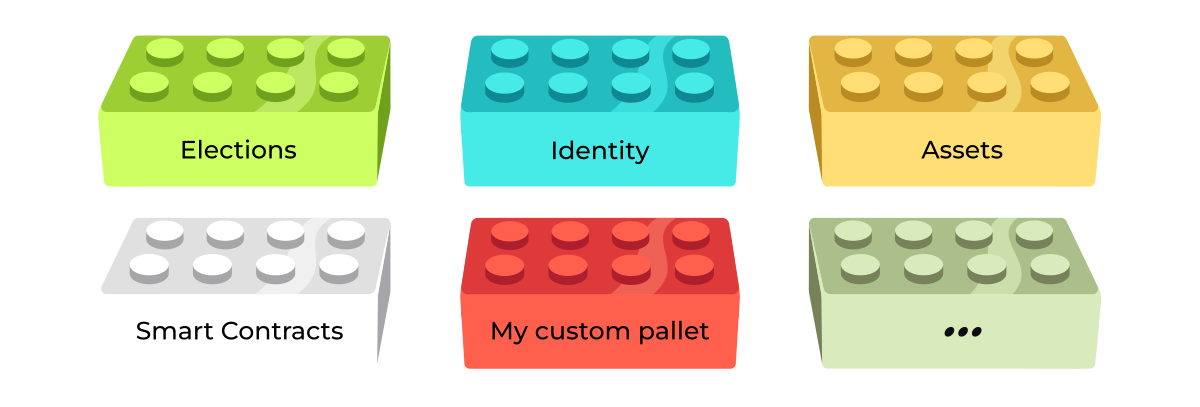
Notes:
- Technically you could take a SC written in ink! and deploy it to any Wasm-powered blockchain.
- in practice not that straight-forward.
- ink! is closely tied to the larger Substrate framework.
- Substrate is a framework for developing customized blockchain runtimes from composable pallets.
Intro: ink! & Substrate
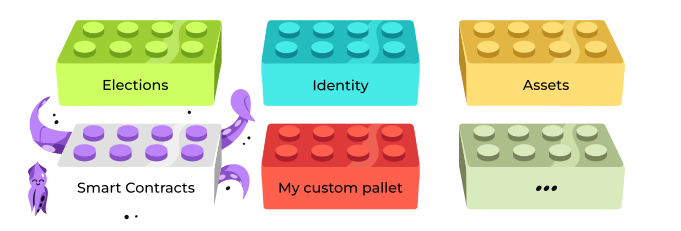
Notes:
- contracts written in ink! are compiled to Wasm bytecode
- pallet contracts provides
- instrumentation
- execution engine
- gas metering
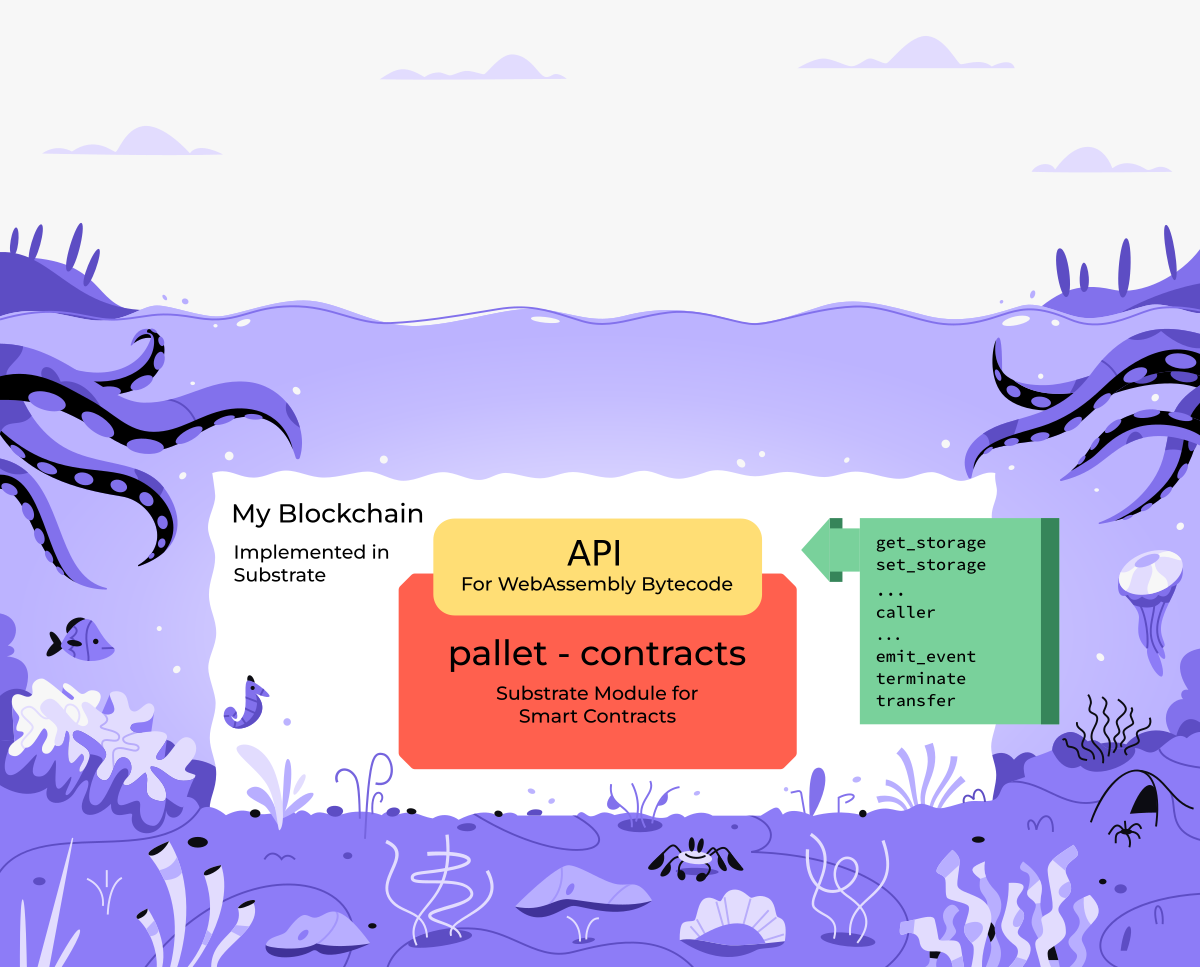
Notes:
- pallet contracts is oblivious to the programming language
- it accepts Wasm bytecode and executes it's instructions
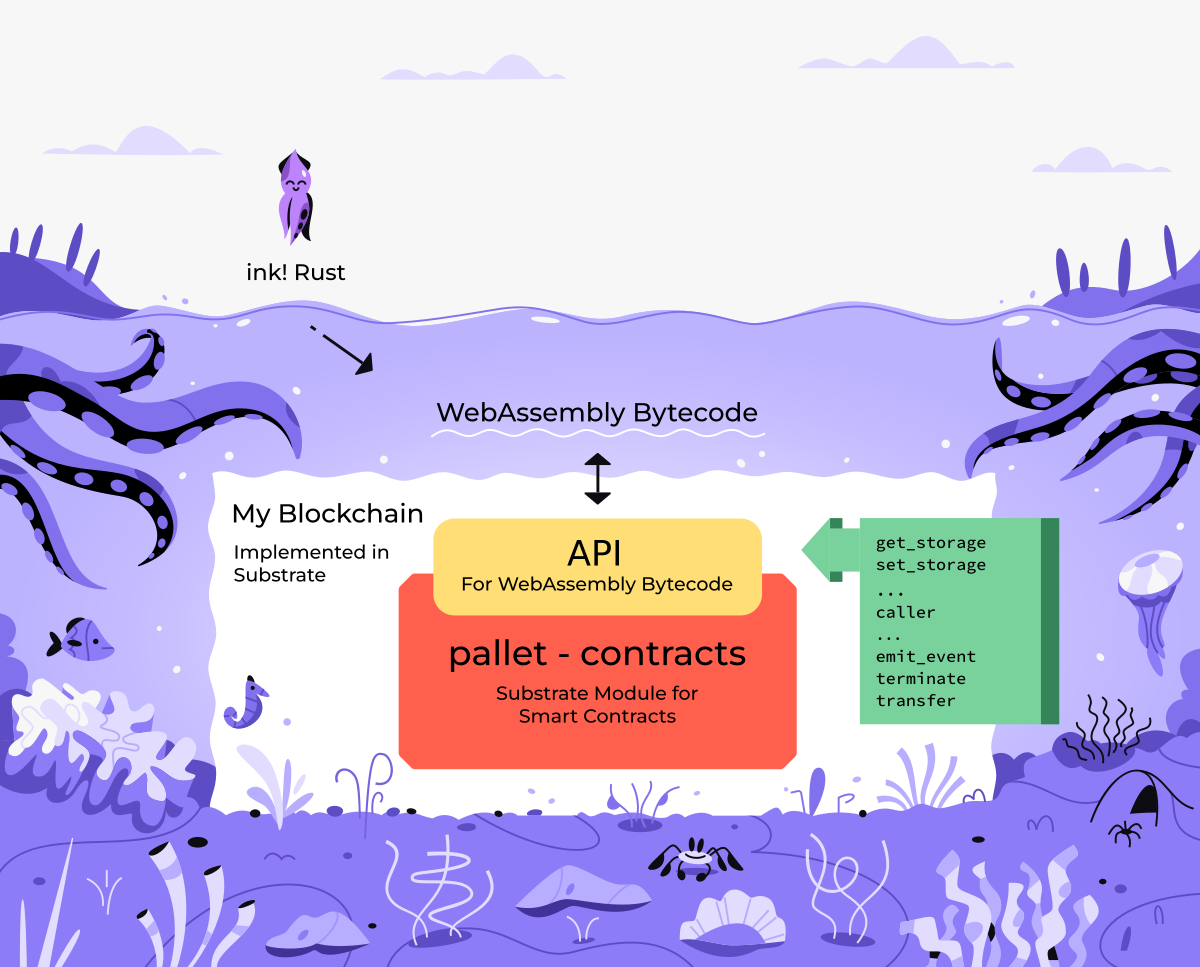
Notes:
- contracts itself can be written in ink!
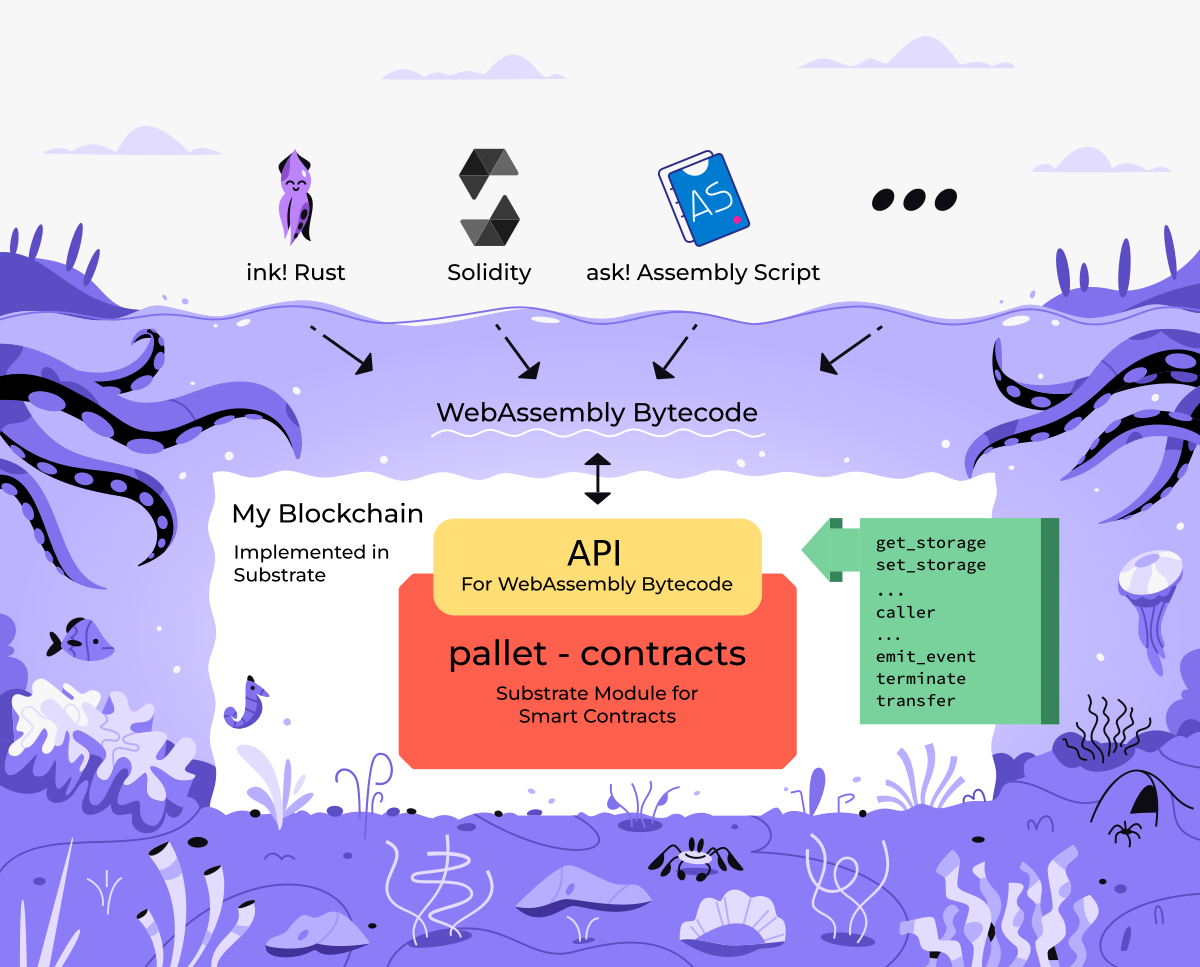
Notes:
- But also any other language that compilers to Wasm
- Solang
- or ask!
Development: Prerequisites
Install the required tooling
sudo apt install binaryen
rustup component add rust-src --toolchain nightly
rustup target add wasm32-unknown-unknown --toolchain nightly
cargo install dylint-link
cargo install cargo-contract --force
- binaryen is a compiler for WebAssembly.
- dylint-link adds DSL specific lints.
Notes:
- Binaryen is a compiler and toolchain infrastructure library for WebAssembly
- at the moment ink! uses a few unstable Rust features, thus nightly is require
- rust source code is needed to compile it to wasm
- wasm target is added
- cargo-contract is a batteries included CLI tool for compiling, deploying and interacting with the contracts
Development: cargo-contract
Create a contract
cargo contract new flipper
/home/CloudStation/Blockchain-Academy/flipper:
drwxrwxr-x 2 filip filip 4096 Jul 7 11:11 .
drwxr-xr-x 5 filip filip 4096 Jul 7 11:11 ..
-rwxr-xr-x 1 filip filip 573 Jul 7 11:11 Cargo.toml
-rwxr-xr-x 1 filip filip 285 Jul 7 11:11 .gitignore
-rwxr-xr-x 1 filip filip 5186 Jul 7 11:11 lib.rs
Notes:
- ask how many student have written some code in Rust, this should feel familiar to them
Development: Cargo.toml
[package]
version = "0.1.0"
authors = ["fbielejec"]
edition = "2021"
[dependencies]
ink = { version = "=4.2.1", default-features = false }
scale = { package = "parity-scale-codec", version = "3", default-features = false, features = ["derive"] }
scale-info = { version = "2.6", default-features = false, features = ["derive"], optional = true }
[lib]
path = "lib.rs"
[features]
default = ["std"]
std = [
"ink/std",
"scale/std",
"scale-info/std",
]
Notes:
- who knows why is the std library not included by default?
- Answer: contracts are compiled to Wasm (executed ib a sandboxed environment with no system interfaces, no IO, no networking)
Developing contracts
contract code
#![allow(unused)] fn main() { #[ink::contract] pub mod flipper { #[ink(storage)] pub struct Flipper { value: bool, } impl Flipper { #[ink(constructor)] pub fn new(init_value: bool) -> Self { Self { value: init_value } } #[ink(constructor)] pub fn default() -> Self { Self::new(Default::default()) } #[ink(message)] pub fn flip(&mut self) { self.value = !self.value; } #[ink(message)] pub fn get(&self) -> bool { self.value } } } }
Notes:
- basic contract that flips a bit in storage
- contract will have a storage definition, constructor(s), messages
- grouped in a module
Developing contracts: Compilation & artifacts
Compile:
cargo +nightly contract build
Artifacts:
[1/*] Building cargo project
Finished release [optimized] target(s) in 0.09s
The contract was built in RELEASE mode.
Your contract artifacts are ready.
You can find them in:
/home/CloudStation/Blockchain-Academy/flipper/target/ink
- flipper.contract (code + metadata)
- flipper.wasm (the contract's code)
- flipper.json (the contract's metadata)
Notes:
- produces Wasm bytecode and some additional artifacts:
- .wasm is the contract compiled bytecode
- .json is contract ABI aka metadata (for use with e.g. dapps)
- definitions of events, storage, transactions
- .contracts is both of these together
Developing contracts: instantiate
Deploy:
cargo contract instantiate --constructor default --suri //Alice
--skip-confirm --execute
Output:
Dry-running default (skip with --skip-dry-run)
Success! Gas required estimated at Weight(ref_time: 138893374, proof_size: 16689)
...
Event Contracts ➜ CodeStored
code_hash: 0xbf18c768eddde46205f6420cd6098c0c6e8d75b8fb042d635b1ba3d38b3d30ad
Event Contracts ➜ Instantiated
deployer: 5GrwvaEF5zXb26Fz9rcQpDWS57CtERHpNehXCPcNoHGKutQY
contract: 5EXm8WLAGEXn6zy1ebHZ4MrLmjiNnHarZ1pBBjZ5fcnWF3G8
...
Event System ➜ ExtrinsicSuccess
dispatch_info: DispatchInfo { weight: Weight { ref_time: 2142580978, proof_size: 9009 }, class: Normal, pays_fee: Yes }
Code hash 0xbf18c768eddde46205f6420cd6098c0c6e8d75b8fb042d635b1ba3d38b3d30ad
Contract 5EXm8WLAGEXn6zy1ebHZ4MrLmjiNnHarZ1pBBjZ5fcnWF3G8
Notes:
- we see a bunch of information on gas usage
- we see two events one for storing contract code another for instantiating the contract
- why is that?
- code & instance are separated, we will come back to that
- finally we see code hash and the newly created contracts address
Interacting with the contracts: queries
cargo contract call --contract 5EXm8WLAGEXn6zy1ebHZ4MrLmjiNnHarZ1pBBjZ5fcnWF3G8
--message get --suri //Alice --output-json
- contract state?
- tip:
defaultconstructor was called
Notes:
- who can tell me what will be the contract state at this point?
Interacting with the contracts: queries
"data": {
"Tuple": {
"ident": "Ok",
"values": [
{
"Bool": false
}
]
}
}
Interacting: transactions
Sign and execute a transaction:
cargo contract call --contract 5EXm8WLAGEXn6zy1ebHZ4MrLmjiNnHarZ1pBBjZ5fcnWF3G8
--message flip --suri //Alice --skip-confirm --execute
Query the state:
cargo contract call --contract 5EXm8WLAGEXn6zy1ebHZ4MrLmjiNnHarZ1pBBjZ5fcnWF3G8
--message get --suri //Alice --output-json
Result:
"data": {
"Tuple": {
"ident": "Ok",
"values": [
{
"Bool": true
}
]
}
}
Notes:
- if I query it again the bit is flipped
- no surprises there
Dev environment: Contracts UI
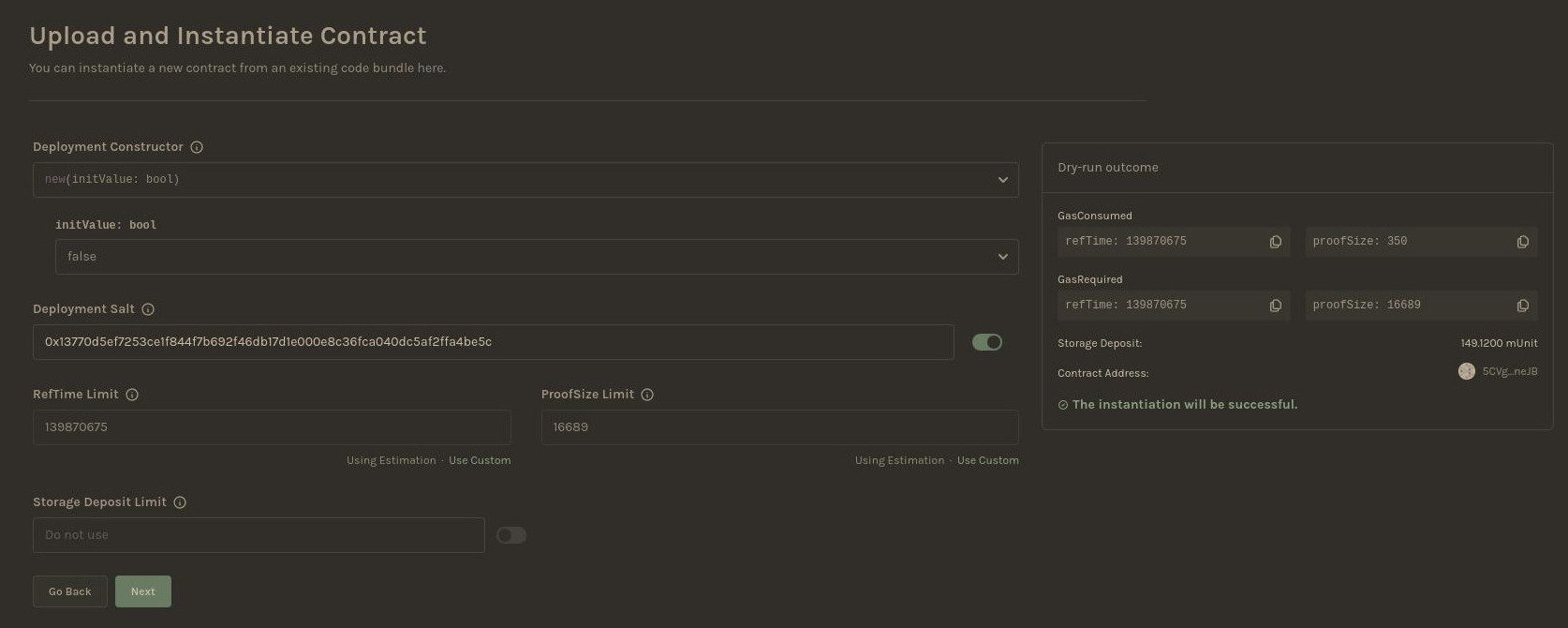
Notes:
- there is also a graphical env for deploying & interacting with contracts
- deploy & create an instance of flipper
Dev environment: Contracts UI
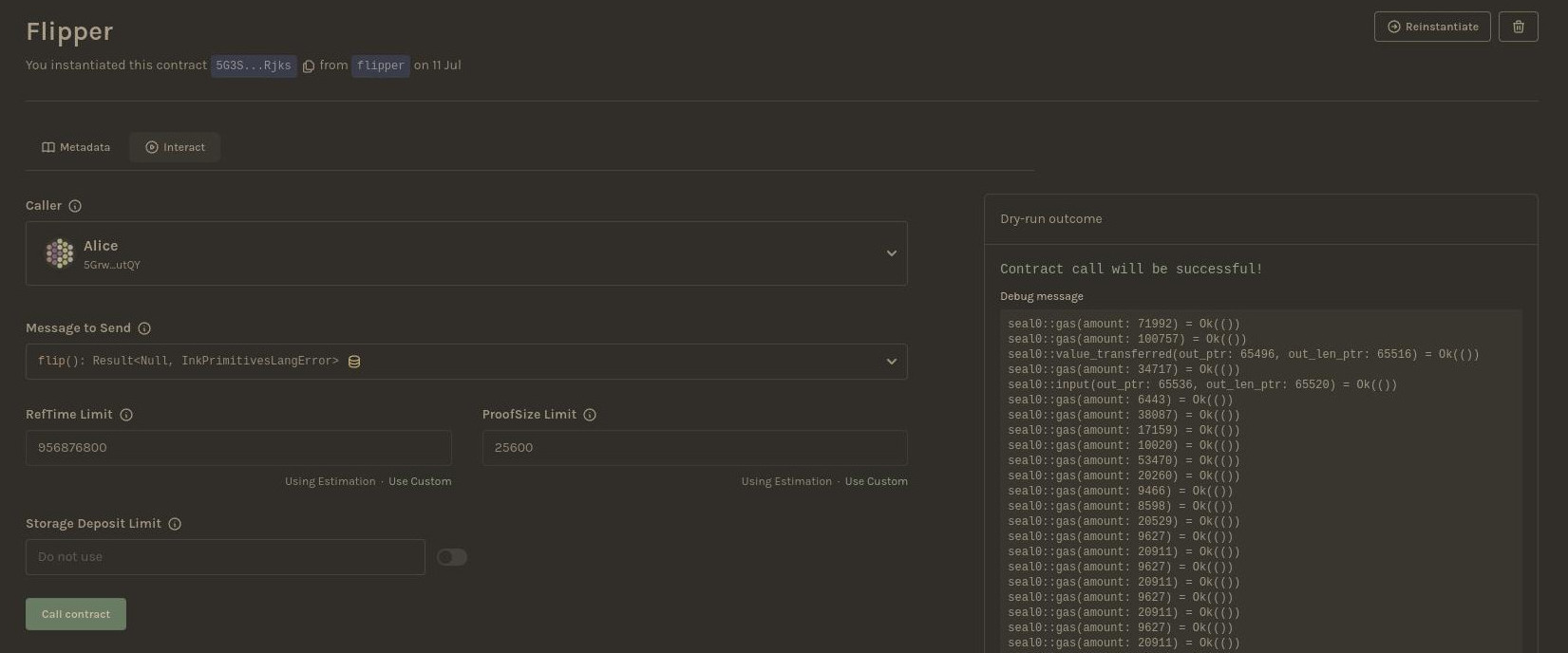
Notes:
- call a transaction
Dev environment: Contracts UI
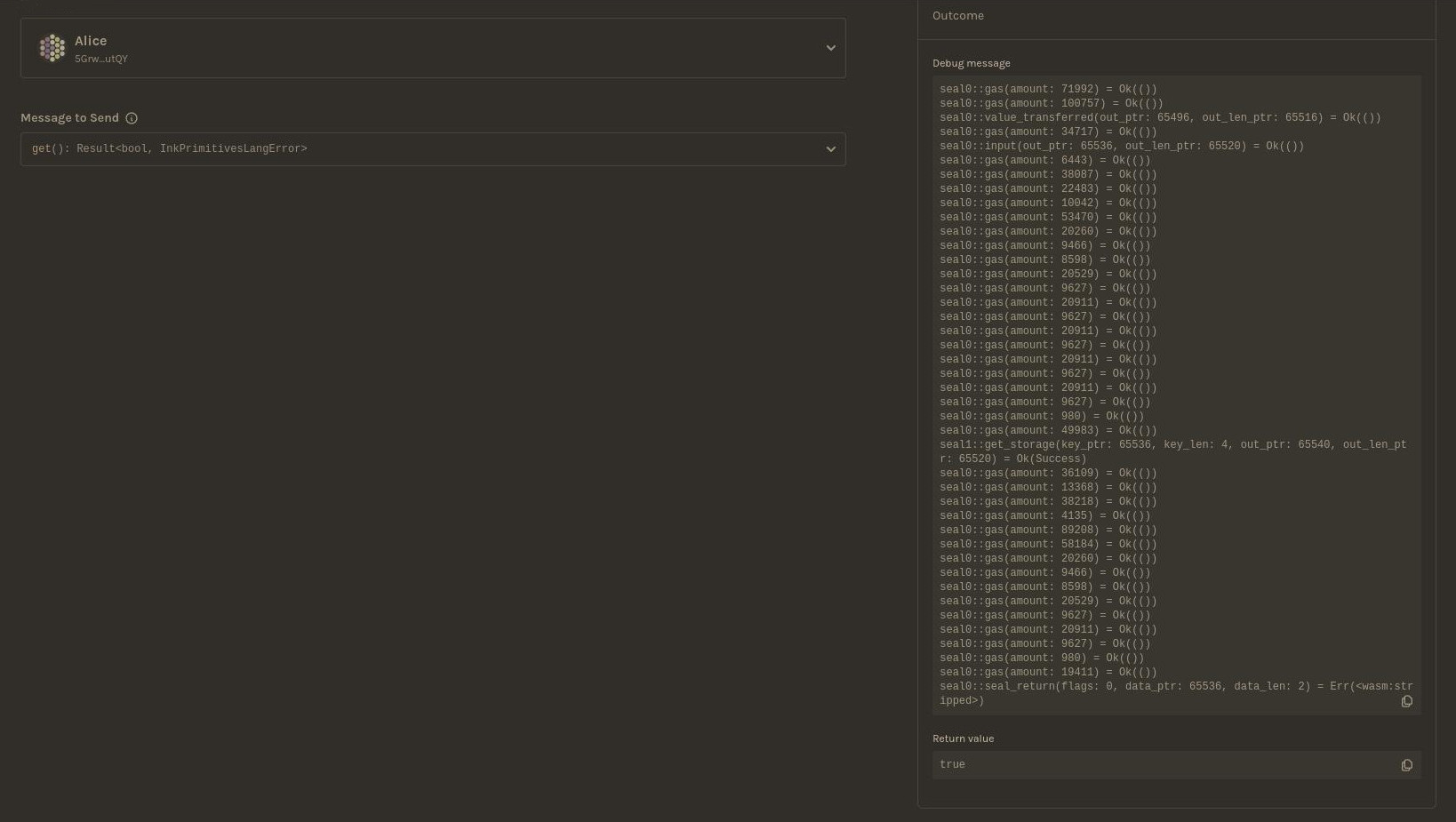
Notes:
- query state
Developing contracts: Constructors
#![allow(unused)] fn main() { #[ink(storage)] pub struct Flipper { value: bool, } #[ink(constructor)] pub fn new(init_value: bool) -> Self { Self { value: init_value } } #[ink(constructor)] pub fn default() -> Self { Self::new(Default::default()) } #[ink(constructor)] pub fn non_default() -> Self { Self::new(false) } }
Notes:
- lets dissect what a contract code is built like
- no limit of the number of constructors
- constructors can call other constructors
- constructors return the initial storage
- a lot of complexity conveniently hidden behind macros
Developing contracts: Queries
#![allow(unused)] fn main() { #[ink(message)] pub fn get(&self) -> bool { self.value } }
#[ink(message)]is how we tell ink! this is a function that can be called on the contract&selfis a reference to the contract's storage
Notes:
- returns information about the contract state stored on chain
- reaches to the storage, decodes it and returns the value
Developing contracts: Mutations
#![allow(unused)] fn main() { #[ink(message, payable)] pub fn place_bet(&mut self, bet_type: BetType) -> Result<()> { let player = self.env().caller(); let amount = self.env().transferred_value(); ... self.data.set(&data); ... }
&mut selfis a mutable reference to the object you’re calling this method onpayableallows receiving value as part of the call to the ink! message
Notes:
- constructors are inherently payable
- ink! message will reject calls with funds if it's not marked as such
- mutable references allow me to modify the storage.
- queries are for free, mutations are metered (you pay gas)
- you will also pay for queries within such transactions
Contracts: Error handling
#![allow(unused)] fn main() { pub enum MyResult<T, E> { Ok(value: T), Err(msg: E), } #[derive(Debug, PartialEq, Eq, Encode, Decode)] #[cfg_attr(feature = "std", derive(scale_info::TypeInfo))] pub enum MyError { InkEnvError(String), BettingPeriodNotOver, } #[ink(message)] pub fn spin(&mut self) -> Result<()> { if !self.is_betting_period_over() { return Err(MyError::BettingPeriodNotOver); ... }; pub type Result<T> = core::result::Result<T, MyError>; }
- ink! uses idiomatic Rust error handling:
Result<T,E>type - Use the Err variant to pass your own semantics
- Type aliases reduce boilerplate & enhance readability
Notes:
- ink! uses idiomatic Rust error handling
messages are thesystem boundary- returning error variant or panicing reverts the transaction
- panicing is the same as returning Err variant (
Resultis just being nice)
- panicing is the same as returning Err variant (
Error handling: call stack
#![allow(unused)] fn main() { #[ink(message)] pub fn flip(&mut self) { self.value = !self.value; if self.env().block_number() % 2 != 0 { panic!("Oh no!") } } }
- what is the state of this contract if the tx is called in an odd block number?
Notes:
- answer: whatever it was prior to the tx:
- returning error variant reverts the entire tx on the call stack
Contracts: Events
#![allow(unused)] fn main() { #[ink(event)] #[derive(Debug)] pub struct BetPlaced { #[ink(topic)] player: AccountId, #[ink(topic)] bet_type: BetType, amount: Balance, } }
- Events are a way of letting the outside world know about what's happening inside the contract.
#[ink(event)]is a macro that defines events.- Topics mark fields for indexing.
Notes:
- events are especially important for dapps
- storage is expensive: reading e.g. aggregate data from chain directly is impossible / impractical
- dapps the can listen to the event, normalize & store off-chain and answer e.g. complex queries
Contracts: Events
#![allow(unused)] fn main() { #[ink(message)] pub fn flip(&mut self) { Self::emit_event( self.env(), Event::Flipped(Flipped { }), ); self.value = !self.value; if self.env().block_number() % 2 == 0 { panic!("Oh no!") } } }
- What happens to the events from reverted transactions?
- Will this event be emitted in an odd block?
Notes:
- answer: yes, but only because I reverted the condition :)
Contracts: Defining shared behaviour
#![allow(unused)] fn main() { #[ink::trait_definition] pub trait PSP22 { #[ink(message)] fn total_supply(&self) -> Balance; #[ink(message)] fn balance_of(&self, owner: AccountId) -> Balance; #[ink(message)] fn approve(&mut self, spender: AccountId, amount: Balance) -> Result<(), PSP22Error>; #[ink(message)] fn transfer(&mut self, to: AccountId, value: Balance, data: Vec<u8>) -> Result<(), PSP22Error>; ... impl SimpleDex { use psp22_trait::{PSP22Error, PSP22}; /// Returns balance of a PSP22 token for an account fn balance_of(&self, token: AccountId, account: AccountId) -> Balance { let psp22: ink::contract_ref!(PSP22) = token.into(); psp22.balance_of(account) } ... }
- Trait Definition:
#[ink::trait_definition]. - Sharing the trait definition to do a cross-contract call.
Notes:
- (part of) PSP22 (ERC20 like) contract definition
- all contracts that respect this definition need to implement it
- you can now share the trait definition with other contracts
- while getting a typed reference to an instance
Deeper dive: Storage
#![allow(unused)] fn main() { use ink::storage::Mapping; #[ink(storage)] #[derive(Default)] pub struct Token { total_supply: Balance, balances: Mapping<AccountId, Balance>, allowances: Mapping<(AccountId, AccountId), Balance>, } }
Notes:
- now that we dipped our toes lets dissect more
- starting with the storage
- what does this code actually put into the chain storage?

SCALE (Simple Concatenated Aggregate Little Endian)
Notes:
- Pallet contracts storage is organized like a key-value database
- each storage cell has a unique storage key and points to a SCALE encoded value
- SCALE codec is not self-describing (vide metadata)
SCALE: examples of different types
| Type | Decoding | Encoding | Remark |
|---|---|---|---|
| Boolean | true | 0x0 | encoded using least significant bit of a single byte |
| false | 0x1 | ||
| Unsigned int | 42 | 0x2a00 | |
| Enum | enum IntOrBool { Int(u8), Bool(bool)} | 0x002a and 0x0101 | first byte encodes the variant index, remaining bytes encode the data |
| Tuple | (3, false) | 0x0c00 | concatenation of each encoded value |
| Vector | [4, 8, 15, 16, 23, 42] | 0x18040008000f00100017002a00 | encoding of the vector length followed by conatenation of each item's encoding |
| Struct | {x:30u64, y:true} | [0x1e,0x0,0x0,0x0,0x1] | names are ignored, Vec |
Notes:
- this table is not exhaustive
- struct example: stored as an vector, names are ignored, only order matters, first four bytes encode the 64-byte integer and then the least significant bit of the last byte encodes the boolean
Storage: Packed Layout
#![allow(unused)] fn main() { use ink::storage::Mapping; #[ink(storage)] #[derive(Default)] pub struct Token { total_supply: Balance, balances: Mapping<AccountId, Balance>, allowances: Mapping<(AccountId, AccountId), Balance>, } }
- By default ink! stores all storage struct fields under a single storage cell (
Packedlayout)
Notes:
- We talked about the kv database that the storage is, now how is it used precisely
- Types that can be stored entirely under a single storage cell are called Packed Layout
- by default ink! stores all storage struct fields under a single storage cell
- as a consequence message interacting with the contract storage will always need to read and decode the entire contract storage struct
- .. which may be what you want or not
Storage: Packed Layout
#![allow(unused)] fn main() { use ink::storage::traits::{ StorageKey, ManualKey, }; #[ink(storage)] pub struct Flipper<KEY: StorageKey = ManualKey<0xcafebabe>> { value: bool, } }
- The storage key of the contracts root storage struct defaults to
0x00000000 - However you may store it under any arbitrary 4 bytes key instead
Storage: Packed Layout
"storage": {
"root": {
"layout": {
"struct": {
"fields": [
{
"layout": {
"leaf": {
"key": "0xcafebabe",
"ty": 0
}
},
"name": "value"
}
],
"name": "Flipper"
}
},
"root_key": "0xcafebabe"
}
}
Notes:
- demonstration of the packed layout - value is stored under the root key
Storage: Un-packed Layout
#![allow(unused)] fn main() { use ink::storage::Mapping; #[ink(storage)] #[derive(Default)] pub struct Token { total_supply: Balance, balances: Mapping<AccountId, Balance>, allowances: Mapping<(AccountId, AccountId), Balance>, } }
- Mapping consists of a key-value pairs stored directly in the contract storage cells.
- Each Mapping value lives under it's own storage key.
- Mapping values do not have a contiguous storage layout: it is not possible to iterate over the contents of a map!
Notes:
- Use Mapping when you need to store a lot of values of the same type.
- if your message only accesses a single key of a Mapping, it will not load the whole mapping but only the value being accessed.
- there are other collection types in ink!: HashMap or BTreeMap (to name a few).
- these data structures are all Packed, unlike Mapping!
Storage: working with Mapping
#![allow(unused)] fn main() { pub fn transfer(&mut self) { let caller = self.env().caller(); let balance = self.balances.get(caller).unwrap_or(0); let endowment = self.env().transferred_value(); balance += endowment; } }
- what is wrong here?
Notes:
- working with mapping:
- Answer: Mapping::get() method will result in an owned value (a local copy), as opposed to a direct reference into the storage. Changes to this value won't be reflected in the contract's storage "automatically". To avoid this common pitfall, the value must be inserted again at the same key after it was modified. The transfer function from above example illustrates this:
Storage: working with Mapping
#![allow(unused)] fn main() { pub fn transfer(&mut self) { let caller = self.env().caller(); let balance = self.balances.get(caller).unwrap_or(0); let endowment = self.env().transferred_value(); self.balances.insert(caller, &(balance + endowment)); } }
Mapping::get()returns a local copy, not a mutable reference to the storage!
Notes:
- working with mapping:
Mapping::get()method will result in an owned value (a local copy).- Changes to this value won't be reflected in the contract's storage at all!
- you need to inserted it again at the same key.
Storage: Lazy
#![allow(unused)] fn main() { use ink::storage::{traits::ManualKey, Lazy, Mapping}; #[ink(storage)] pub struct Roulette { pub data: Lazy<Data, ManualKey<0x44415441>>, pub bets: Mapping<u32, Bet, ManualKey<0x42455453>>, } }
- Every type wrapped in
Lazyhas a separate storage cell. ManualKeyassignes explicit storage key to it.- Why would you want to use a
ManualKeyinstead of a generated one?
Notes:
- packed layout can get problematic if we're storing a large collection in the contracts storage that most of the transactions do not need access too
- there is a 16kb hard limit on a buffer used for decoding, contract trying to decode more will trap / revert
- lazy provides per-cell access, like a mapping
- lazy storage cell can be auto-assigned or chosen manually
- using ManualKey instead of AutoKey might be especially desirable for upgradable contracts, as using AutoKey might result in a different storage key for the same field in a newer version of the contract.
- This may break your contract after an upgrade!
Storage: Lazy

Notes:
- only the pointer (the key) to the lazy type is stored under the root key.
- only when there is a read of
dwill the pointer be de-referenced and it's value decoded. - lazy is a bit of a mis-nomer here, because storage is already initialized.
Contracts upgradeability: set_code_hash
#![allow(unused)] fn main() { #[ink(message)] pub fn set_code(&mut self, code_hash: [u8; 32]) -> Result<()> { ink::env::set_code_hash(&code_hash)?; Ok(()) } }
- Within SC's lifecycle it is often necessary to perform an upgrade or a bugfix.
- Contract's code and it's instance are separated.
- Contract's address can be updated to point to a different code stored on-chain.
Notes:
- append only != immutable
- proxy pattern known from e.g. solidity is still possible
- within the Substrate framework contract's code is stored on-chain and it's instance is a pointer to that code
- incentivizes cleaning up after oneself
- big storage optimization
Contracts upgradeability: access control
#![allow(unused)] fn main() { #[ink(message)] pub fn set_code(&mut self, code_hash: [u8; 32]) -> Result<()> { ensure_owner(self.env().caller())?; ink::env::set_code_hash(&code_hash)?; Ok(()) } }
Notes:
- you DO NOT want to leave this message un-guarded
- solutions to
ensure_ownercan range from a very simple ones address checks - to a multiple-role database of access controlled accounts stored and maintained in a separate contract
Upgradeability: storage
#![allow(unused)] fn main() { #[ink(message)] pub fn get_values(&self) -> (u32, bool) { (self.x, self.y) } #[ink(storage)] pub struct MyContractOld { x: u32, y: bool, } #[ink(storage)] pub struct MyContractNew { y: bool, x: u32, } }
- Make sure your updated code is compatible with the existing contracts state.
- Will the getter work with the new definition and the old storage ?
Notes:
- Various potential changes that can result in backwards incompatibility:
- Changing the order of variables
- Introducing new variable(s) before any of the existing ones
- Changing variable type(s)
- Removing variables
- Answer: no, SCALE encoding is oblivious to names, only order matters
Upgradeability: storage migrations
#![allow(unused)] fn main() { // new contract code #[ink(message)] pub fn migrate(&mut self) -> Result<()> { if let Some(OldContractState { field_1, field_2 }) = get_contract_storage(&123)? { self.updated_old_state.set(&UpdatedOldState { field_1: field_2, field_2: field_1, }); return Ok(()); } return Err(Error::MigrationFailed); } // old contract code #[ink(message)] pub fn set_code(&mut self, code_hash: [u8; 32], callback: Option<Selector>) }
Notes:
- if the new contract code does not match the stored state you can perform a storage migration
- think of regular relational DB and schema migrations
- a good pattern to follow is to perform the update and the migration in one atomic transaction:
- if anything fails whole tx is reverted
- won't end up in a broken state
- make sure it can fit into one block!
Common Vulnerabilities
#![allow(unused)] fn main() { impl MyContract { #[ink(message)] pub fn terminate(&mut self) -> Result<()> { let caller = self.env().caller(); self.env().terminate_contract(caller) } ... } }
- What is wrong with this contract?
- How would you fix it?
Notes:
- we start easy
- answer: no AC in place
- parity wallet 150 million
hack
Common Vulnerabilities: blast from the past
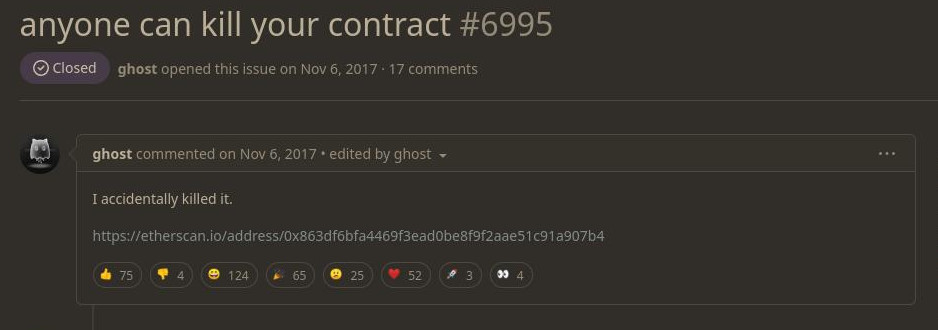
Notes:
- might seem trivial but a very similar hack has happend in the past trapping a lot of funds
- see: https://etherscan.io/address/0x863df6bfa4469f3ead0be8f9f2aae51c91a907b4#code
- hacker has "accidentally" called an unprotected
initMultiownedand proceeded to delete the contract code
Common Vulnerabilities
#![allow(unused)] fn main() { #[ink(storage)] pub struct SubstrateNameSystem { registry: Mapping<AccountId, Vec<u8>>, } impl SubstrateNameSystem { #[ink(message, payable)] pub fn register(&mut self, name: Vec<u8>) { let owner = self.env().caller(); let fee = self.env().transferred_value(); if !self.registry.contains(owner) && fee >= 100 { self.registry.insert(owner, &name); } } }
- On-chain domain name registry with a register fee of 100 pico.
- Why is this a bad idea?
Notes:
- everything on-chain is public
- this will be front-run in no time
- Can you propose a better design?
- Answer: commit / reveal or an auction
Common Vulnerabilities
#![allow(unused)] fn main() { #[ink(message)] pub fn swap( &mut self, token_in: AccountId, token_out: AccountId, amount_token_in: Balance, ) -> Result<(), DexError> { let this = self.env().account_id(); let caller = self.env().caller(); let amount_token_out = self.out_given_in(token_in, token_out, amount_token_in)?; // transfer token_in from user to the contract self.transfer_from_tx(token_in, caller, this, amount_token_in)?; // transfer token_out from contract to user self.transfer_tx(token_out, caller, amount_token_out)?; ... } }
- Contract is a DEX Decentralized EXchange, follows the popular AMM (Automated Market Maker) design.
- Tx swaps the specified amount of one of the pool's PSP22 tokens to another PSP22 token according to the current price.
- What can go wrong here?
Notes:
Answer:
- no slippage protection in place.
- bot will frontrun the victim's tx by purchasing token_out before the trade is executed.
- this purchase will raise the price of the asset for the victim trader and increases his slippage
- if the bot sells right after the victims tx (back runs the victim) this is a sandwich attack
Common Vulnerabilities
#![allow(unused)] fn main() { #[ink(message)] pub fn swap( &mut self, token_in: AccountId, token_out: AccountId, amount_token_in: Balance, min_amount_token_out: Balance, ) -> Result<(), DexError> { ... if amount_token_out < min_amount_token_out { return Err(DexError::TooMuchSlippage); } ... } }
Notes:
- slippage protection in place
Common Vulnerabilities
- Integer overflows
- Re-entrancy vulnerabilities
- Sybil attacks
- ...
- Regulatory attacks 😅
- ...
Notes:
- long list of possible attacks
- too long to fit into one lecture
- baseline: get an audit from a respectable firm
- publish your source code (security by obscurity is not security)
Pause
Optional challenge: github.com/Polkadot-Blockchain-Academy/adder
Notes:
Piotr takes over to talk about making runtime calls from contracts and writing automated tests. There is a 15 minute challenge for you in the meantime.
Interacting with the execution environment
#![allow(unused)] fn main() { impl MyContract { ... #[ink(message)] pub fn terminate(&mut self) -> Result<()> { let caller = self.env().caller(); self.env().terminate_contract(caller) } ... } }
Blockchain node onion
Blockchain node onion

Blockchain node onion

- networking
- block production, dissemination, finalization
- storage management
- off-chain maintenance, querying, indexing
Blockchain node onion

- computing new state based on the previous one and a single transaction
Blockchain node onion

- executing contract calls
Standard API
caller()account_id()balance()block_number()emit_event(event: Event)transfer(dest: AccountId, value: Balance)hash_bytes(input: &[u8], output: &mut [u8])debug_message(msg: &str)- and many more
Standard API
#![allow(unused)] fn main() { impl MyContract { ... #[ink(message)] pub fn terminate(&mut self) -> Result<()> { let caller = self.env().caller(); self.env().terminate_contract(caller) } ... } }
Interacting with the state transition function
- token transfer
- staking
- voting
- contract call
- ...
- advanced cryptography
- bypassing standard restrictions
- outsourcing computation
- ...
Interacting with the state transition function
- advanced cryptography
- bypassing standard restrictions
- outsourcing computation
- ...
chain extension
Runtime
In Polkadot ecosystem state transition function is called runtime
Calling runtime
#![allow(unused)] fn main() { #[ink(message)] pub fn transfer_through_runtime( &mut self, receiver: AccountId, value: Balance, ) -> Result<(), RuntimeError> { let call_object = RuntimeCall::Balances(BalancesCall::Transfer { receiver, value, }); self.env().call_runtime(&call_object) } }
Calling runtime
#![allow(unused)] fn main() { #[ink(message)] pub fn transfer_through_runtime( &mut self, receiver: AccountId, value: Balance, ) -> Result<(), RuntimeError> { let call_object = RuntimeCall::Balances(BalancesCall::Transfer { receiver, value, }); self.env().call_runtime(&call_object) } }
Chain extensions
Chain extension is a way to extend the runtime with custom functionalities dedicated to contracts.
Chain extensions
ink! side:
- provide
ChainExtensiontrait - include extension in the
Environmenttrait instantiation
runtime side:
- handling extension calls
- extension logic itself
Provide ChainExtension trait
#![allow(unused)] fn main() { #[ink::chain_extension] pub trait OutsourceHeavyCrypto { type ErrorCode = OutsourcingErr; #[ink(extension = 41)] fn outsource(input: Vec<u8>) -> [u8; 32]; } pub enum OutsourcingErr { IncorrectData, } impl ink::env::chain_extension::FromStatusCode for OutsourcingErr { fn from_status_code(status_code: u32) -> Result<(), Self> { match status_code { 0 => Ok(()), 1 => Err(Self::IncorrectData), _ => panic!("encountered unknown status code"), } } } }
Provide ChainExtension trait
#![allow(unused)] fn main() { #[ink::chain_extension] pub trait OutsourceHeavyCrypto { type ErrorCode = OutsourcingErr; #[ink(extension = 41)] fn outsource(input: Vec<u8>) -> [u8; 32]; } pub enum OutsourcingErr { IncorrectData, } impl ink::env::chain_extension::FromStatusCode for OutsourcingErr { fn from_status_code(status_code: u32) -> Result<(), Self> { match status_code { 0 => Ok(()), 1 => Err(Self::IncorrectData), _ => panic!("encountered unknown status code"), } } } }
Include extension in the Environment trait instantiation
#![allow(unused)] fn main() { pub enum EnvironmentWithOutsourcing {} impl Environment for EnvironmentWithOutsourcing { ... // use defaults from `DefaultEnvironment` type ChainExtension = OutsourceHeavyCrypto; } #[ink::contract(env = crate::EnvironmentWithOutsourcing)] mod my_contract { ... } }
Include extension in the Environment trait instantiation
#![allow(unused)] fn main() { #[ink::contract(env = crate::EnvironmentWithOutsourcing)] mod my_contract { fn process_data(&mut self, input: Vec<u8>) -> Result<(), OutsourcingErr> { self.env().extension().outsource(subject) } } }
Handling extension calls
#![allow(unused)] fn main() { pub struct HeavyCryptoOutsourcingExtension; impl ChainExtension<Runtime> for HeavyCryptoOutsourcingExtension { fn call<E: Ext>(&mut self, env: Env) -> Result<RetVal, DispatchError> { match env.func_id() { 41 => internal_logic(), _ => { error!("Called an unregistered `func_id`: {func_id}"); return Err(DispatchError::Other("Unimplemented func_id")) } } Ok(RetVal::Converging(0)) } }
Chain extension: reaching even further

Testing contracts
Testing contracts

Testing contracts

Unit tests
#![allow(unused)] fn main() { #[ink::test] fn erc20_transfer_works() { let mut erc20 = Erc20::new(100); assert_eq!(erc20.balance_of(BOB), 0); // Alice transfers 10 tokens to Bob. assert_eq!(erc20.transfer(BOB, 10), Ok(())); // Bob owns 10 tokens. assert_eq!(erc20.balance_of(BOB), 10); let emitted_events = ink::env::test::recorded_events().collect::<Vec<_>>(); assert_eq!(emitted_events.len(), 2); // Check first transfer event related to ERC-20 instantiation. assert_transfer_event( &emitted_events[0], None, Some(ALICE), 100, ); // Check the second transfer event relating to the actual transfer. assert_transfer_event( &emitted_events[1], Some(ALICE), Some(BOB), 10, ); } }
Unit tests
#![allow(unused)] fn main() { #[ink::test] fn erc20_transfer_works() { let mut erc20 = Erc20::new(100); assert_eq!(erc20.balance_of(BOB), 0); // Alice transfers 10 tokens to Bob. assert_eq!(erc20.transfer(BOB, 10), Ok(())); // Bob owns 10 tokens. assert_eq!(erc20.balance_of(BOB), 10); let emitted_events = ink::env::test::recorded_events().collect::<Vec<_>>(); assert_eq!(emitted_events.len(), 2); // Check first transfer event related to ERC-20 instantiation. assert_transfer_event( &emitted_events[0], None, Some(ALICE), 100, ); // Check the second transfer event relating to the actual transfer. assert_transfer_event( &emitted_events[1], Some(ALICE), Some(BOB), 10, ); } }
Unit tests
#![allow(unused)] fn main() { #[ink::test] fn erc20_transfer_works() { let mut erc20 = Erc20::new(100); assert_eq!(erc20.balance_of(BOB), 0); // Alice transfers 10 tokens to Bob. assert_eq!(erc20.transfer(BOB, 10), Ok(())); // Bob owns 10 tokens. assert_eq!(erc20.balance_of(BOB), 10); let emitted_events = ink::env::test::recorded_events().collect::<Vec<_>>(); assert_eq!(emitted_events.len(), 2); // Check first transfer event related to ERC-20 instantiation. assert_transfer_event( &emitted_events[0], None, Some(ALICE), 100, ); // Check the second transfer event relating to the actual transfer. assert_transfer_event( &emitted_events[1], Some(ALICE), Some(BOB), 10, ); } }
E2E tests
#![allow(unused)] fn main() { #[ink_e2e::test] async fn e2e_transfer(mut client: ink_e2e::Client<C, E>) -> E2EResult<()> { let constructor = Erc20Ref::new(total_supply); let erc20 = client .instantiate("erc20", &ink_e2e::alice(), constructor, 0, None) .await .expect("instantiate failed"); let mut call = erc20.call::<Erc20>(); let total_supply_msg = call.total_supply(); let total_supply_res = client .call_dry_run(&ink_e2e::bob(), &total_supply_msg, 0, None) .await; ... } }
E2E tests
#![allow(unused)] fn main() { #[ink_e2e::test] async fn e2e_transfer(mut client: ink_e2e::Client<C, E>) -> E2EResult<()> { let constructor = Erc20Ref::new(total_supply); let erc20 = client .instantiate("erc20", &ink_e2e::alice(), constructor, 0, None) .await .expect("instantiate failed"); let mut call = erc20.call::<Erc20>(); let total_supply_msg = call.total_supply(); let total_supply_res = client .call_dry_run(&ink_e2e::bob(), &total_supply_msg, 0, None) .await; ... } }
E2E tests
#![allow(unused)] fn main() { #[ink_e2e::test] async fn e2e_transfer(mut client: ink_e2e::Client<C, E>) -> E2EResult<()> { let constructor = Erc20Ref::new(total_supply); let erc20 = client .instantiate("erc20", &ink_e2e::alice(), constructor, 0, None) .await .expect("instantiate failed"); let mut call = erc20.call::<Erc20>(); let total_supply_msg = call.total_supply(); let total_supply_res = client .call_dry_run(&ink_e2e::bob(), &total_supply_msg, 0, None) .await; ... } }
E2E pipeline: traps, traps everywhere
- Preparing and encoding transaction data (client side)
- Signing the transaction (client side)
- Sending transaction to a node (client side)
- Block and event subscribing (client side)
- Transaction pool processing (node side)
- Block building (node side)
- Block dissemination (node side)
- Import queue processing (node side)
- Block finalizing (node side)
- Block execution (node side)
- Transaction execution (runtime side)
- Event emitting (node side)
- Event capturing (client side)
- Event processing (client side)
- State fetching via RPC calling (client side)
- State report (node side)
- State validation (client side)
E2E pipeline: traps, traps everywhere

Test core
- Preparing and encoding transaction data (given)
- Transaction execution (when)
- State validation (then)
quasi-E2E tests
Interact directly with runtime, skipping node layer.
quasi-E2E tests
#![allow(unused)] fn main() { #[test] fn flipping() -> Result<(), Box<dyn Error>> { let init_value = Session::<MinimalRuntime>::new(transcoder())? .deploy_and(bytes(), "new", &["true".to_string()], vec![])? .call_and("flip", &[])? .call_and("flip", &[])? .call_and("flip", &[])? .call_and("get", &[])? .last_call_return() .expect("Call was successful"); assert_eq!(init_value, ok(Value::Bool(false))); Ok(()) } }